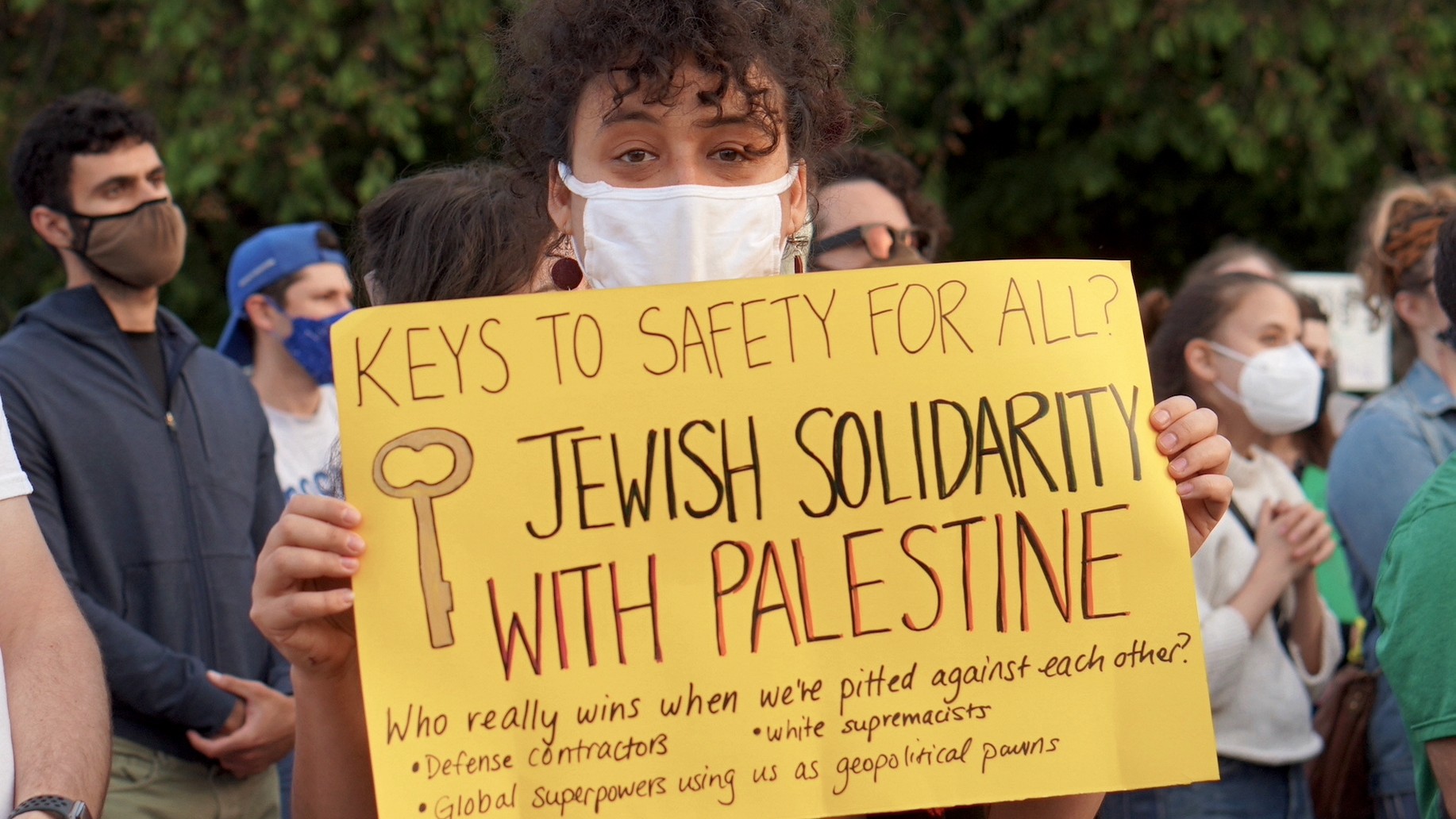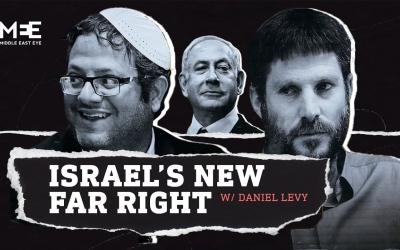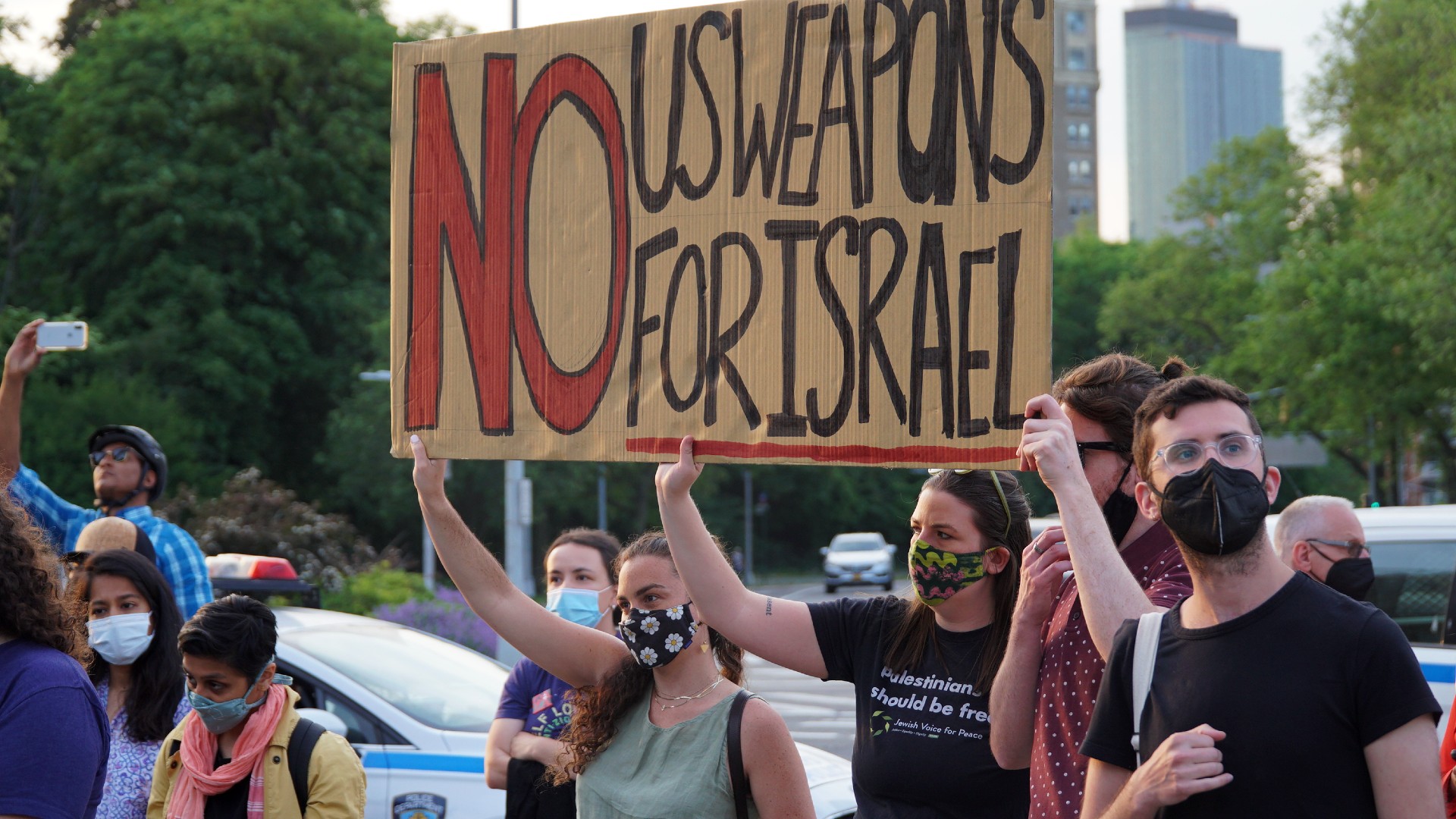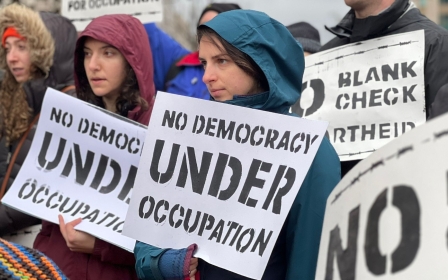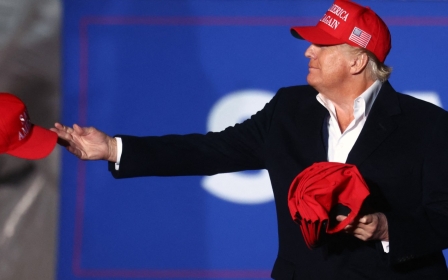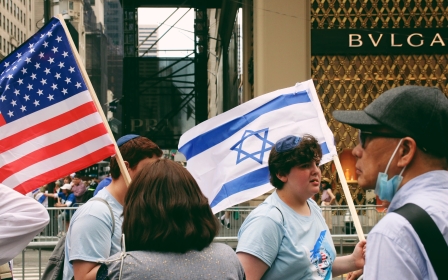Israel's shift to the far right tests American Jewish support
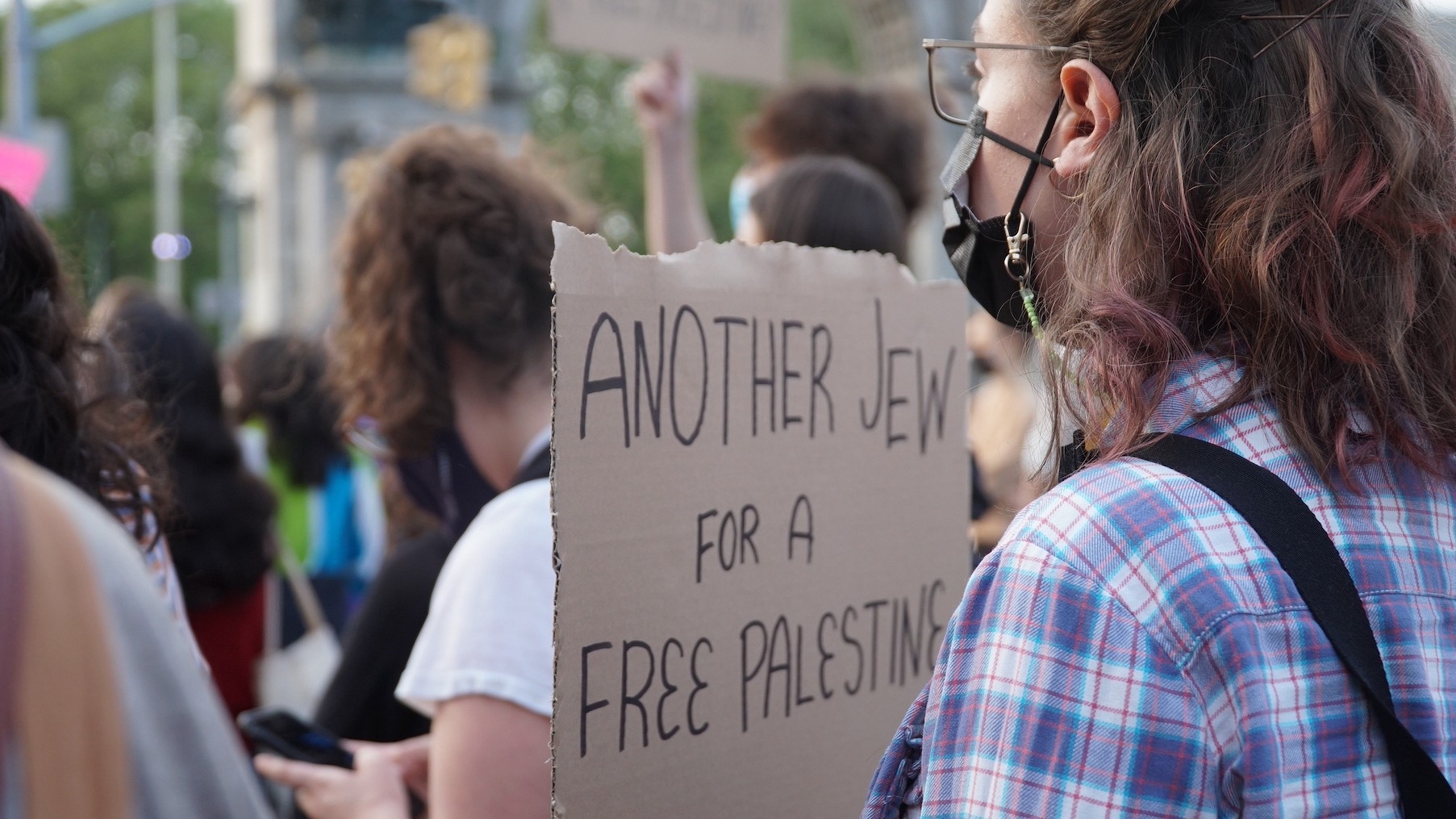
The Jewish American debate about Israel has fundamentally changed.
For decades, the relationship has been complex and disparate. But the election of the most right-wing government in Israeli history, and its proposed judicial reforms curtailing the powers of the Supreme Court, has left many in the community reevaluating their relationship with the state.
As in Israel, where protests and opposition have forced Prime Minister Benjamin Netanyahu to postpone the reforms for now, the shift in the country’s politics to the far right has set off an unprecedented mobilisation among segments of the Jewish American community, including some usually dead set against public repudiations of Israel.
For instance, in February, around 150 law professors in the US signed a letter warning that the reforms would grant the ruling coalition "absolute power."
In March, close to three dozen leaders associated with the Jewish Federations of North America travelled to Israel to lobby against the move.
New MEE newsletter: Jerusalem Dispatch
Sign up to get the latest insights and analysis on Israel-Palestine, alongside Turkey Unpacked and other MEE newsletters
Even the avowedly pro-Israel jurist and Trump acolyte Alan Dershowitz went on record to say that the move would make his job "a lot harder in defending Israel in human rights courts, in the court of public opinion, on university campuses."
Some pro-Israel lobby groups have also expressed unease, albeit gently, about the proposed changes to the judicial system.
In a statement in late March, the American Jewish Committee (AJC) said that Israel would remain a democracy if the proposals were passed "but a democracy with fewer protections than exist now”.
The American Israel Public Affairs Committee (AIPAC), which protesters in Israel had urged to “no longer remain silent” during a visit to Tel Aviv by senior officials in March, said there was a "vigorous debate under way in Israel… which is reflective of the Jewish state's robust democracy."
The Anti-Defamation League (ADL) "urged all sides in Israel and the diaspora to remain committed to reasonable compromise and constructive discourse."
"In its 75th year, we look forward to Israel moving through this crisis and to a healthy and vibrant future for the country and for all the Jewish people," the ADL added.
The discomfort within the larger Jewish American public with the proposed judicial reform was accompanied by a call from some Jewish American business leaders for disinvestment from Israel as well as for the boycott of Jewish organisations who continue to offer uncritical support of Israel, the Forward reported.
"For the last couple weeks I've gotten calls saying: 'I don't want to give to [the] federation because you're supporting Israel'," said Lonnie Nasatir, president of the Jewish United Fund, the Chicago federation.
On one hand, the level of discord between Jewish American establishment organisations and Netanyahu's far-right coalition marks an unprecedented departure from these organisations’ traditionally staunch and uncritical support for past governments of Israel.
"A lot of those people who've always said 'defending Israel is my job no matter what' have become critical for the first time," Hadar Susskind, president of Americans for Peace Now, told Middle East Eye.
On the other hand, the criticism levelled at Netanyahu's government, as it has been in Israel, has been stunted and incomplete.
Those pro-Israel Jewish American organisations who had taken the unusual step to raise their concerns about the judicial reform side-stepped the systemic prejudice already built in to Israel's legal system, which denies Palestinians equal rights under Israeli law.
Their critiques neatly fit inside the contours of protecting Israel's reputation, averting a potential future US-Israeli fall-out and fortifying the democratic rights enjoyed by Jewish-Israeli citizens.
But in private, activists say, large swathes of the Jewish American community, including but not limited to liberals, are also frustrated and concerned with the barrage of violence meted out against Palestinians over the past year.
Growing awareness of the often deadly nightly raids by Israeli forces and episodes of settler-led violence in towns across the occupied West Bank have made it harder to exclude the question of Israel's treatment of the Palestinians from discussions within the community about its slide from an ethnocracy to a full-scale authoritarian state.
"People are reckoning with the question of what it means to take seriously the basic principle of equality and democracy between Jews and Palestinians," Eva Borgwardt, political director of IfNotNow, an organisation focused on ending US support of Israel's occupation, told MEE.
"It's clear that equality and democracy is not compatible with apartheid. We are seeing this conversation taking place in a lot of institutions, in a lot of circles and at a lot of levels.
"I think there is a broader conversation about what that would actually mean and the transformation it would require," she said.
Jewish American resistance
When it comes to supporting Israel, American Jews have never existed as a monolith.
Nonetheless, recent polls appear to indicate growing numbers of American Jews are taking more critical positions on Israel.
For instance, a 2021 survey conducted by the Jewish Electorate Institute, a polling organisation associated with Jewish Democrats, found that 34 percent of those polled concluded that "Israel's treatment of Palestinians is similar to racism in the United States."
It also found that 25 percent felt that Israel was an apartheid state.
The same poll also found that 58 percent of Jewish Americans supported restricting US assistance to Israel to prevent the expansion of settlements.
In another commissioned by J-Street in 2022, 89 percent of Jewish Americans polled said it was possible to be "pro-Israel" and critical of Israeli policy.
There were also, as Rabbi Gilad Kariv, an Israeli lawmaker said last month during a visit to New York, Jewish Americans on the far-right who were supporting the proposed judicial reforms in Israel. Speaking to Haaretz, Kariv said that Jewish American leaders who opposed the moves still had the capacity to influence the decisions back in Israel.
At the same time, observers say it’s important not to overstate the anxieties of American Jews on the question of Israel.
"There's a myth that American Jews - the thing they care most about in the world - is Israel. This is not true," Eric Alterman, the New York-based historian and author of We Are Not One: A History Of America's Fight Over Israel, told MEE.
"So in terms of the American Jewish population, Israel is not that central to their politics. It's central to some certainly conservative American Jews, right-wing American Jews are very involved in Israel, but most American Jews are not."
Meanwhile, left-wing activist organisations like Jewish Voice for Peace (JVP), IfNotNow, and Americans for Peace Now are more vocal about Israeli abuses than ever, often mobilising rallies or disrupting the events of pro-Israel politicians in the US.
Last month, JVP, which describes itself as the biggest anti-Zionist group in the US, launched a campaign against AIPAC.
"We’re ready to expose AIPAC as the anti-democracy, pro-apartheid organisation it has always been while simultaneously pushing forward the fight to end US military funding for Israeli apartheid," JVP said.
AIPAC did not respond to a request for comment.
Borgwardt, from IfNotNow, said that some in the American Jewish community are seeing the emergence of the Netanyahu government as a "mask off" moment.
"If organisations do not move with the public in starting to draw these connections between the judicial reform and the occupation and escalating violence, they will become more irrelevant than they already are," Borgwardt said.
"Many of the Jewish American establishment legacy organisations are already deeply out of touch with the majority of [the] American Jewish community, and certainly with young Jews," Borgwardt said.
"I think, in this moment, an additional swathe of the American Jewish public is waking up to the deeper systemic condition that has empowered Netanyahu and this right-wing government," Borgwardt added.
'I have seen the brutality'
Borgwardt's comments are mirrored in the sentiments of other Jewish American activists who call for an end to US military support and a boycott of Israel over the occupation and daily brutality meted out to Palestinians.
"It offends me tremendously what Zionists are doing in the name of Jewish people," Tarak Kauf, an 80-year-old activist with the group Veterans for Peace, told MEE.
"I have been to Palestine. I have seen the oppression. I have seen the roadblocks. I have seen the checkpoints. I have seen the brutality," he added.
'I have been to Palestine. I have seen the oppression. I have seen the roadblocks. I have seen the checkpoints. I have seen the brutality'
- Tarak Kauf, Veterans for Peace
Another Jewish activist, Mindy Gershon, with Adalah-NY, cited the raids on the Al-Aqsa Mosque complex in early April in which Israeli forces bludgeoned Palestinian worshippers with the butts of their assault rifles.
"There can be no excuse for going into a mosque in the middle of the night, when people are praying, during Ramadan, and beating people with their guns," Gershon said.
Though the shift among Jewish Americans has also spooked the Israeli leadership, government officials have made it clear it would not be swayed by the criticism from the outside.
In February, Amichai Chikli, Israel's diaspora affairs minister, said that while Jewish Americans were welcome to express their opinions, their views carried no weight when it came to the country's internal affairs.
Chikli's comments continue a wider feud between the far-right Israeli leadership and liberal Jewish Americans.
For its repeated criticisms of the prime minister, Netanyahu has described the liberal Zionist Jewish group J-Street, which calls for a two-state solution and opposes the Boycott Divestment and Sanction (BDS) campaign, “a radical left organisation”.
Even the Biden administration has not been spared.
When Biden criticised the proposed judicial reforms, Netanyahu hit back, describing Israel as "a sovereign country which makes its decisions by the will of its people and not based on pressures from abroad, including from the best of friends".
Days later, Netanyahu postponed the judicial reform, but several observers noted that the Israeli PM's comments had come with a certain obstinacy not usually associated with Israeli leaders in their dealings with Washington.
And as has been the trend over the past decade in particular, one that escalated under former President Donald Trump, Israel's far-right remains a lot more comfortable with the Republican Party and Christian Zionists.
Not only have most Christian Zionists cheered on the consolidation of the far-right Netanyahu government, they have also accused those Israelis who have taken to the streets to critique the proposed judicial reforms of effectively undermining the security of the state.
The American establishment
For most of Israel’s history, most Jewish Americans supported the country no matter what it did, said Alterman.
"That period is mostly over," Alterman said.
Whereas there have been several inflection points in the Jewish American community when it comes to their relationship with Israel over the decades, some activists believe the community has reached another critical juncture.
Though there has been very little appetite in Israel to include the issue of Palestine in protests since the mass rallies began three months ago, for those Jewish Americans for whom Israel has become an affront to their identity, ending the occupation is at the top of their list.
But Alterman said that while Jewish Americans feel that the US government should be placing conditions on Israel, this sentiment is not one shared by US lawmakers.
And it's not only Congress.
"Biden is deeply invested in the old idea of Israel that Americans have held for a long time. I think in the future, Democratic presidents will be more sympathetic to the idea of saying Israel if you want our support, you're gonna have to behave differently towards peace and with the Palestinians," Alterman added.
"The Israeli government is now worse from the standpoint of American Jews than any Israeli government has ever been. It's going to be more brutal to the Palestinians; it's going to be less democratic.
"It's going to be harsh on gays and lesbians. And it's going to get a lot less support. And the divisions will become stronger and stronger, and become more and more supported by the far right and, and less and less supported by the left and centre.
"[But] that doesn't mean that the United States will stop supporting Israel."
Alterman's point is exemplified in a recent letter co-written by Senator Bernie Sanders and US lawmaker Jamaal Bowman that called on the Biden administration to investigate, among other things, whether US arms are being used in human rights violations by the Israeli military.
It also called for an end to US taxpayer money in the building of illegal Jewish-only settlements in the occupied West Bank.
"At this inflection point, we ask your administration to undertake a shift in US policy in recognition of the worsening violence, further annexation of land, and denial of Palestinian rights," the letter read.
The letter, touted by observers as unprecedented, only managed to secure 14 signatures in all, underlining continuing support for Israel in Congress.
But for activists, the die has been cast.
They believe Israel's illegal occupation, including its apartheid policies, are now firmly part of the lexicon of progressive politics.
And even if they recognise that the Jewish American community does not wield direct influence over Israel, they understand that exerting pressure on the US government remains the only way they might exert some change.
"The question remains whether this will turn into a broader mask-off moment and a broader opposition to the occupation and apartheid of Palestinians," Borgwardt, from IfNotNow, says.
It's still a long shot, but Borgwardt says Jewish Americans who oppose with equal temerity, both the far-right in Israel and the oppression of Palestinians, need to mobilise more than ever before.
"The majority of the Jewish American public who are opposed to the policies of settlement expansion, human rights violations, have to firstly, get organised and secondly, have to reach for and unite with Palestinians and the rest of the progressive movements in the US. We cannot win alone.
"And the stakes couldn't be any higher," she added.
Middle East Eye delivers independent and unrivalled coverage and analysis of the Middle East, North Africa and beyond. To learn more about republishing this content and the associated fees, please fill out this form. More about MEE can be found here.


